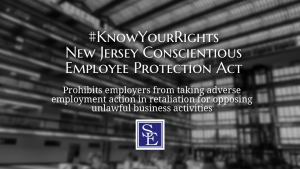The New Jersey Supreme Court recently provided further clarification on what an employee must ‘know’ to be able to sustain a claim against their employer under the New Jersey whistleblower protection law, the Conscientious Employee Protection Act (CEPA). In July 2019, the court issued its opinion in the case Chiofalo v. State, finding that an employee’s whistleblower retaliation claim should not necessarily be dismissed because the employee did not identify the specific law that the employee believed their employer to have been violating. The court held that, where an employee held a reasonable belief that complained of conduct was criminal or fraudulent, that is enough to come within the broad remedial scope of the CEPA whistleblower protection statute.
The plaintiff in that case, Frank Chiofalo, was a Sergeant with the State Police when he allegedly refused to participate in activity that he alleged be believed to be criminal or fraudulent. Specifically, Sgt. Chiofalo alleged that he was directed by a supervisor to destroy a record from a fellow officer’s personnel file. The record in question was a “letter of appreciation” that memorialized a police escort that was provided to a civilian. This record was potentially damaging, as the escort in question was not officially sanctioned, violated policy, and led to an internal review by the State Police. Sgt. Chiofalo alleged that because he refused to destroy this record to protect the other officer, he was subjected to discipline when he was demoted and denied a promotion. Sgt. Chiofalo then filed suit, claiming that his rights were violated under the CEPA whistleblower protection law.
The Appellate Division found that Sgt. Chiofalo’s CEPA claim had to be dismissed because he had failed to specifically identify a statute, regulation, or public policy that the conduct he complained of was or would have been in violation of. The New Jersey Supreme Court disagreed and reversed that aspect of the decision. The Court agreed with the Appellate Division that the plaintiff must have had a reasonable belief that the complained of conduct violated the law, that reasonable belief did not have to be specific or particularized. The Court reiterated language from prior precedent “that [courts] do not expect whistleblower employees to be lawyers on the spot.” Rather, they can rely on their perception and later, with the assistance of counsel, identify the specific statute, regulation, or public policy that the conduct was in violation of.
The Supreme Court emphasized that the ruling was not a blank check for employees seeking to file whistleblower claims under the CEPA statute. While employees do not need to show that they identified the law the complained of conduct violated at the time they complained or objected, after consultation with counsel their pleading should set forth “the legal underpinnings for claimed behavior that is perceived as criminal or fraudulent . . . sufficiently for identification purposes.” Driving home the point, the Court stated that a plaintiff bringing a whistleblower claim under the CEPA statute should be able to identify the law they believe was violated if and when the defense raises that question to them. While plaintiffs are not expected to be lawyers, they should still understand the facts of their claim that would “support an objective belief that a violation has occurred.”
In this case, Sgt. Chiofalo did not specifically identify a violation when he raised his CEPA claim, and the defense never inquired into what violation the CEPA claim was based on. As a result, when the defense moved for summary judgment and argued that the plaintiff had failed to sustain his burden in establishing a CEPA claim, the Court held that it is proper for courts to inquire into whether sufficient facts were set forth to satisfy CEPA, as set forth above. While this turned out in Sgt. Chiofalo’s favor, the lesson to plaintiffs is to specifically identify the statute, regulation, or public policy that was violated. By taking this determination out of the hands of the court, plaintiffs will have greater control over their case.
This decision is considered a win for employees by New Jersey employment lawyers. The Court’s decision will provide further further protections for whistleblowing New Jersey employees due to the expansive reading of this remedial New Jersey statute. Whistleblowing employees who face retaliation or discrimination because of their activities are protected under CEPA – this ruling ensures that more employees will be protected, and more meritorious cases will be able to proceed. While CEPA plaintiffs can now breathe a little easier in the wake of this decision, this ruling should not be construed as giving plaintiffs permission to poorly plead their CEPA claims. While the decision shows that some whistleblower claims under the CEPA statute will survive despite poor pleading, the less should be that plaintiffs are well-served by pleading their CEPA whistleblower lawsuit correctly the first time.
 New Jersey Employment Lawyers Blog
New Jersey Employment Lawyers Blog


